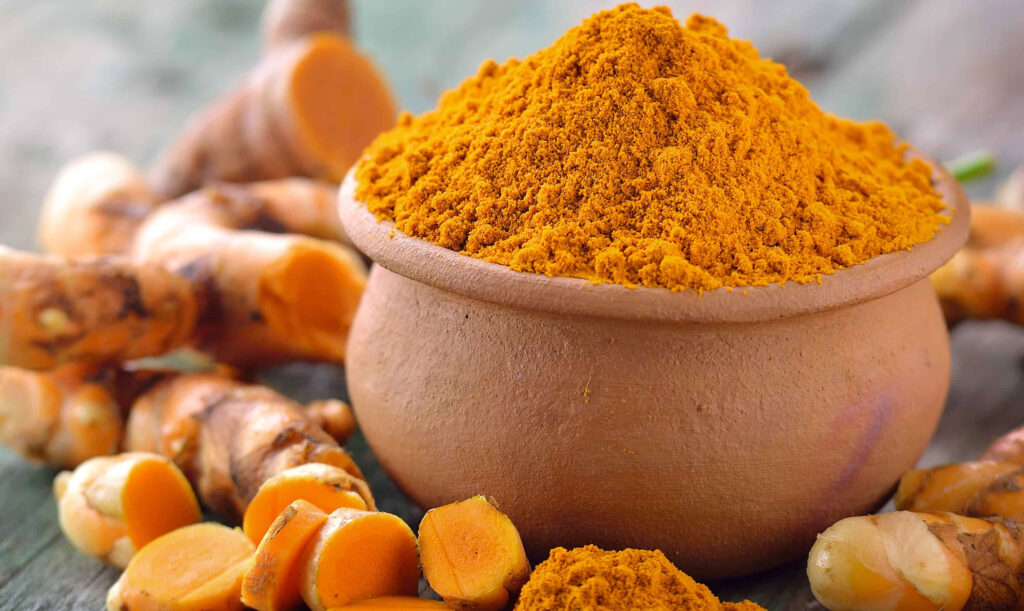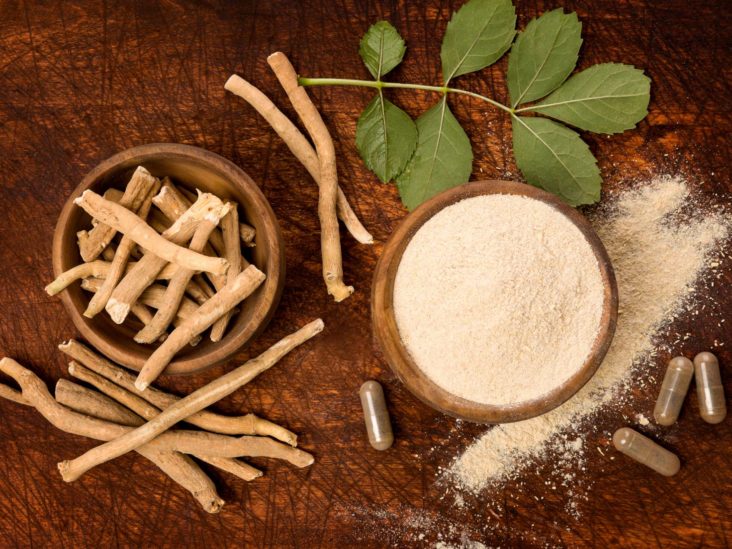Kurkuma: Das goldene Kraut
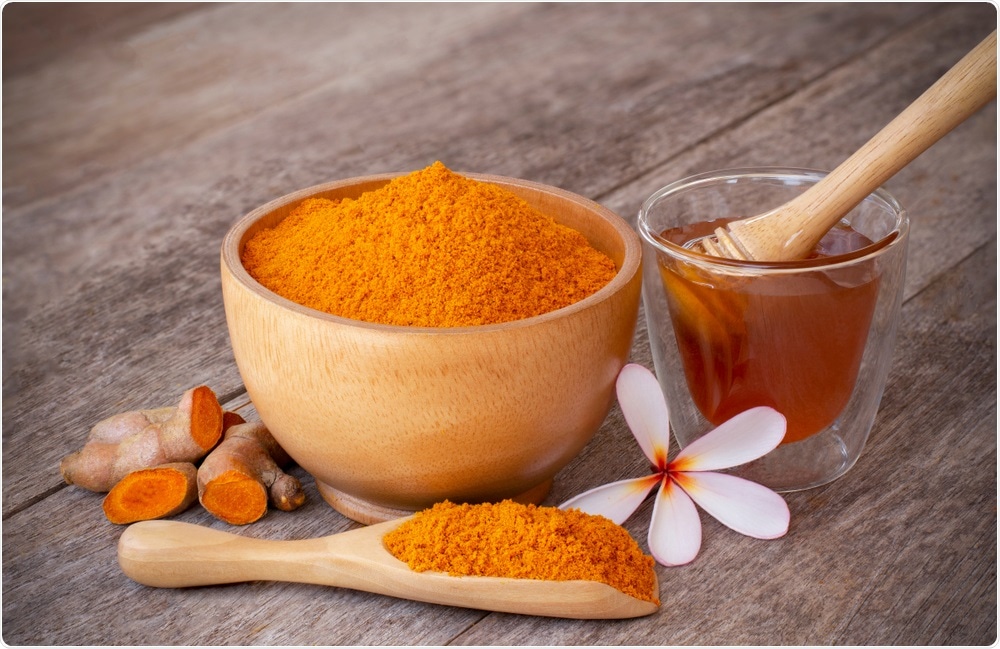
Kurkuma ist ein Grundnahrungsmittel in der indischen Küche – sei es, um unsere Currys zu würzen oder in köchelnde Milch zu geben, um eine laufende Nase zu lindern. Egal, ob es sich um einen schwindelerregenden Fieberschüb, einen Akneausbruch oder einen langsam heilenden Bluterguss handelt, Kurkuma hat immer seinen Weg in die Hausmittel unserer Oma gefunden.
Kurkuma (Curcuma longa) ist eine mehrjährige krautige Pflanze aus der Familie der Ingwergewächse. Sie ist in den tropischen, niederschlagsreichen Regionen Südasiens beheimatet und wird vor allem in Indien angebaut. Indische Kurkuma gilt aufgrund ihrer inhärenten Eigenschaften und der hohen Bioverfügbarkeit von Curcumin als die beste der Welt. Das goldfarbene Kurkumapulver wird durch Mahlen des unterirdischen Stängels der Pflanze, eines Rhizoms, gewonnen. Die Verwendung von Kurkuma als kulinarische Zutat geht auf das vedische Indien aus dem Jahr 2000 v. Chr. zurück.
Die heilenden Eigenschaften von Kurkuma machen es zu einem erstaunlichen Kraut, das in vielen ayurvedischen Rezepturen verwendet wird. Kurkuma ist in Sanskrit als Haridra bekannt, was so viel bedeutet wie dasjenige, das Hari oder Lord Vishnu schmückt. Seine strahlend gelbe Farbe ist verheißungsvoll und integraler Bestandteil verschiedener Rituale. Es besitzt eine Vielzahl von heilenden Eigenschaften und hat antioxidative und entzündungshemmende Eigenschaften.
Dieses leuchtend gelbe Gewürz wurde als Superfood gefeiert. Curcumin, einer der wichtigsten Wirkstoffe von Kurkuma, wurde aufgrund seiner entzündungshemmenden Eigenschaften ausgiebig erforscht. Es verbessert die Immunität und hilft, den Blutzuckerspiegel aufrechtzuerhalten. Es hilft bei einer gesunden Verdauung und hebt Ihre Stimmung.
Kurkuma im Ayurveda

Im Ayurveda wird Kurkuma als Vayasthapana, was Alterungswiederhersteller, und Ojo vardhana, oder Vitalitätsverstärker, klassifiziert wird. Es gleicht Vata- und Kapha-Dosha aufgrund seiner Ushna- oder heißen Potenz aus. Es gleicht Pitta wegen seiner Bitterkeit aus. Daher gleicht es alle drei Doshas aus. Es unterstützt gesundes Rasa dhatu (Plasma) und Rakta dhatu (Blut) und nährt das Kreislaufsystem, indem es seine gesundheitlichen Vorteile im ganzen Körper zirkulieren lässt. Es unterstützt Agni (gesunder Stoffwechsel) und erhält so eine optimale Verdauungskraft.
Eigenschaften von Kurkuma

Kurkuma hat viele Eigenschaften, die es zu einem unschätzbaren Inhaltsstoff in vielen ayurvedischen Formulierungen machen. Schauen wir uns einige der herausragenden Eigenschaften von Kurkuma an:
- Turmeric for pimples: Curcumin, the active principle of turmeric, has potent anti-microbial properties. Since ancient times, it has been a well-known and effective remedy for many skin issues.
- Turmeric for pain relief: Enriched with anti-inflammatory properties, turmeric is effective in joint issues.
- Antioxidant: Turmeric is a rich source of antioxidants, protecting the body from the adverse effects of free radicals.
- Turmeric for Diabetes: Turmeric possesses anti-diabetic properties, helping decrease blood sugar levels and may reduce the effects of diabetes complications.
- Turmeric for weight loss: Turmeric is a metabolism booster that reduces fat tissue growth.
Gesundheitliche Vorteile von Kurkuma
Haridra (Curcuma longa) oder Kurkuma ist der indische Safran und das goldene Gewürz. Die Vorteile von Haridra wurden in klassischen Ayurveda-Texten ausführlich diskutiert. Die Tatsache, dass Haridra 80 Synonyme hat, ist ein Beweis für seine utilitaristischen Vorteile, die vor Tausenden von Jahren erkannt wurden.
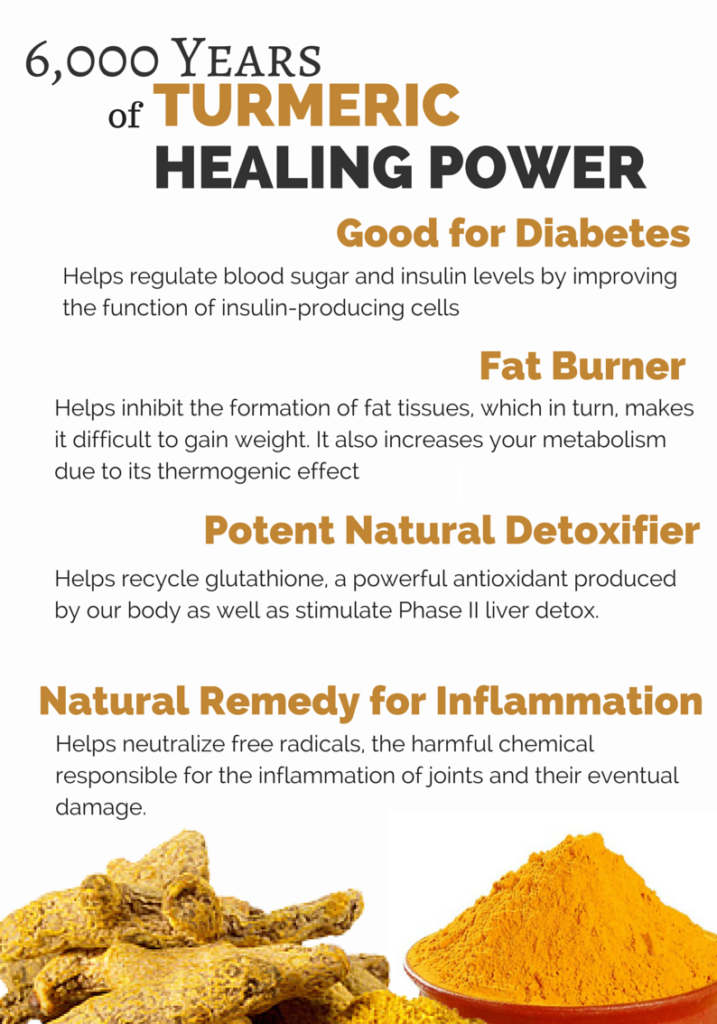
- Turmeric for immunity – Turmeric is known as an immunity booster herb. Curcumin, an active compound found in turmeric, has anti-inflammatory properties that can help fight colds, flu, and other microbial diseases. Turmeric milk, or Haldi doodh has traditionally been a healing remedy for colds and coughs.
- Turmeric for pimples – Turmeric has been linked to beauty therapies because of its skin healing properties. It has over 300 antioxidants that help brighten skin and prevent breakouts. A face pack of sandalwood, turmeric, and milk can effectively remove tan.
- Turmeric for wound healing – Turmeric has antiseptic properties that can promote quick wound healing. Topical application of turmeric over fresh or chronic wounds promotes faster wound healing. It also prevents and cures fungal infections.
- Turmeric for digestion – The antioxidant and anti-inflammatory property of turmeric boosts digestion and soothes the stomach lining. The Katu (pungent) taste escalates the Agni (digestive power) and facilitates the secretion of digestive juice.
- Turmeric for cholesterol – Turmeric improves your blood vessels’ function and keeps cholesterol in check. It helps improve circulation and reduces the triglyceride levels.
- Turmeric for pain relief and joint health– It improves the functioning of joints by easing joint pain and improving flexibility. It can help reduce the inflammation of joints, relieving swelling. Due to curcumin’s presence, turmeric helps relieve joint issues. It is inherently Vata-kapha pacifying in nature and has a soothing effect on the locomotor system. Ayurveda Acharya Vagbhata included turmeric in the Haridradi group, indicated for curing rheumatism. Contemporary studies have confirmed that curcumin, the key ingredient of turmeric, protects soft tissues, including cartilage.
- Turmeric for brain health – Curcumin boosts levels of the brain hormone BDNF. This hormone boosts the growth of new neurons and may help fight various brain degeneration. It is also said to improve memory and concentration and reduce anxiety.
- Turmeric for liver – Turmeric helps in detoxification and helps maintain liver health. Studies have confirmed that it may help heal nonalcoholic fatty liver. It helps reduce oxidative stress and assists in liver regeneration.
- Turmeric for diabetes – Turmeric helps reduce blood sugar and associated complications in type 2 diabetes. It also assists in healthy weight management. It improves fasting blood sugar levels and insulin resistance.
Kurkuma Hausmittel
Da die Menschen sich vieler Vorteile von Kurkuma bewusst sind, wurde es häufig in Hausmitteln verwendet. Schauen wir uns einige bekannte Verwendungen von Kurkuma an:
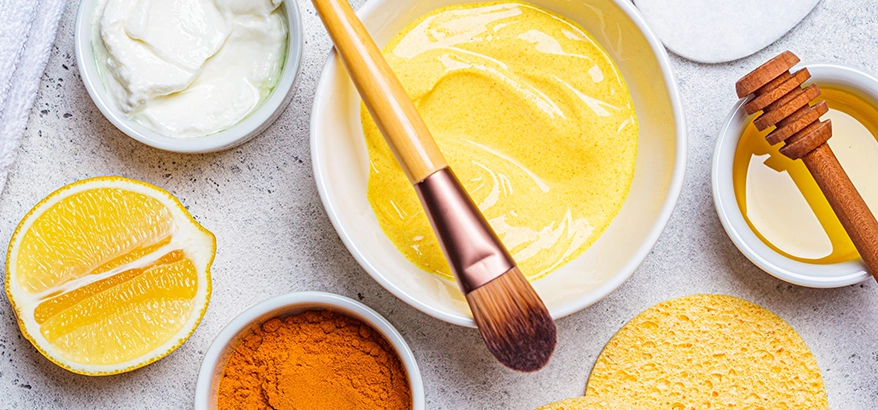
- Turmeric milk is a traditional, soothing drink, often called golden milk, used to soothe a sore throat and other inflammatory conditions. To prepare Turmeric milk, add ¼ teaspoon of turmeric and a pinch of black pepper powder into a glass of warm milk and drink. This turmeric milk is well known for treating colds and coughs. It is also suitable for promoting sleep. Adding pepper helps in better absorption of curcumin.
- Turmeric is used in many face packs. Because of its antimicrobial and healing properties. For oily skin, use of turmeric powder with lemon juice or multani mitti, and for dry skin, use it with milk as a face pack. Apply it for 10-15 minutes and wash with cold water. It helps clear pigmentation, acne, blemishes, and tan.
- For relieving a sore throat, mix one teaspoon honey with ½ teaspoon turmeric powder and consume 2-3 times a day.
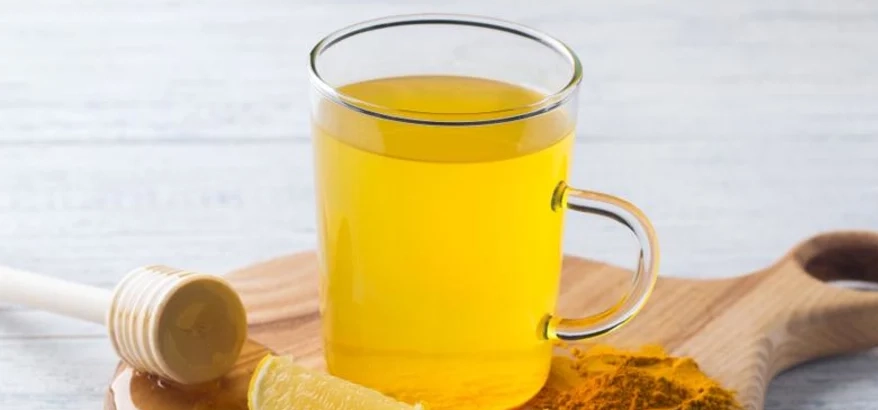
- Turmeric tea is a soothing and warm blend of herbs steeped slowly to detoxify your body. Boil 200 ml of water and add one inch of freshly grated turmeric or ½ teaspoon of turmeric powder. Strain and add one teaspoon of lemon juice and honey as required.
- Mix one tablespoon of amla juice with a pinch of turmeric and consume on an empty stomach to balance your blood sugar levels.
Nebenwirkungen von Kurkuma
Kurkuma ist unbedenklich für den Verzehr. In der indischen Küche wurde in der Antike Kurkuma verwendet. Man sollte jedoch die möglichen Nebenwirkungen von Kurkuma kennen, wenn man es als Nahrungsergänzungsmittel verwendet oder in großen Mengen einnimmt.
- If taken in large quantities, turmeric might cause gastric irritation, diarrhea, or mild discomfort.
- Some commercially available turmeric powders with harmful colorants and fillers, such as rye might be adulterated. These can cause ill effects, so always consume turmeric from reliable sources.
- Turmeric has an anti-coagulant effect, so if you are on blood thinners like warfarin, it may lead to excessive bleeding.
- Turmeric might lead to drug interactions if you are on other medications. If you are on any other medication or have any health issues, it is better to consult your Doctor before taking any turmeric or curcumin supplement.
- Turmeric might stimulate contractions, so any turmeric or curcumin supplement should be avoided by pregnant women.
Wichtige Takeaways
- Turmeric is a herb with potent healing properties
- This golden spice has a particular affinity towards blood and promotes detoxification.
- Turmeric has immense health benefits that range from managing diabetes to improving heart health.
- It is essential to consume turmeric or curcumin supplement only from reliable sources to avoid possible side effects of adulterated turmeric.
- Adding a pinch of black pepper can help better to absorb curcumin, the active component of turmeric.
